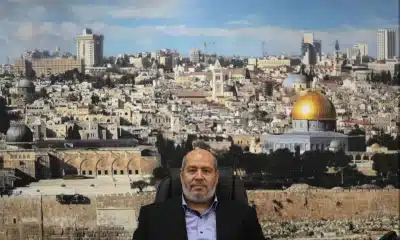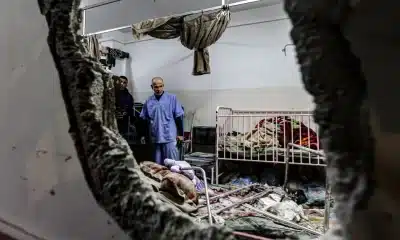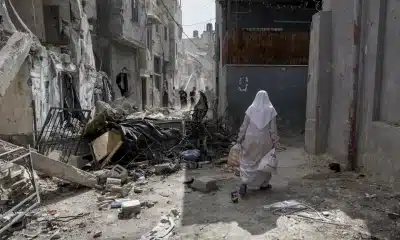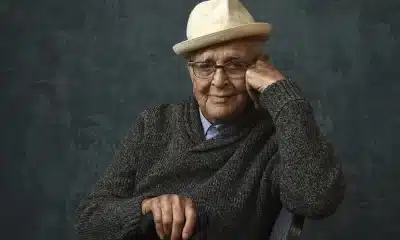World
British Envoy Says Israel Is ‘Making A Decision To Act’ As Iran Vows To Respond To Any Incursion

JERUSALEM — British Foreign Secretary David Cameron said Wednesday that Israel “is making a decision to act” in response to Iran’s missile and drone attacks over the weekend, while Iran warned that even the “tiniest” assault of its territory would result in a “massive and harsh” reaction.
Israel has promised to retaliate to Iran’s unprecedented attack without specifying when or how leaving the region braced for more escalation following months of turmoil connected to the ongoing conflict in Gaza. Israel’s closest allies, including the United States and the United Kingdom, who assisted in repelling the Iranian strike, are attempting to contain any further escalation.
AP- VOR News Image
British Envoy Says Israel Is ‘Making A Decision To Act’ As Iran Vows To Respond To Any Incursion
Iran’s President Ebrahim Raisi, meanwhile, warned Israel against retribution as he attended an annual army parade, which had been shifted to a barracks from its customary route and was not shown live on state television, possibly due to fears of being targeted.
In remarks broadcast by Iran’s official IRNA news agency, Raisi said Saturday’s attack was limited and that if Iran had intended to carry out a larger attack, “nothing would remain from the Zionist regime.”
Adding to already high tensions, Lebanon’s Hezbollah launched a rocket attack on a northern Israeli border town on Wednesday, injuring 13 people, four of them critically, according to the Israeli rescue service Magen David Adom. The Iran-backed militant organization said it was in revenge for the deaths of several of its fighters, including a commander, in Israeli airstrikes on Lebanon the day before.
On Wednesday, Cameron and Germany’s Foreign Minister Annalena Baerbock visited Israel separately to meet top officials. The two European countries, Israel’s closest allies, have recommended caution.
Cameron stated that “it’s clear the Israelis are making a decision to act” against Iran, but he hoped they would do so “in a way that is smart as well as tough and also does as little as possible to escalate this conflict.” He said that after meeting with Israel’s President, Isaac Herzog, whose position is largely ceremonial,
Cameron stated that the primary goal of his visit was to refocus attention on the ongoing conflict in Gaza, including the need for a cease-fire and the release of Hamas hostages.
Baerbock stated that Germany is “in full solidarity with Israel” but urged it to exhibit caution.
“Everyone must now be prudent and responsible. I am not talking about giving in. “I am talking about prudent restraint, which is nothing short of strength,” she told reporters. “Because Israel has already shown strength with its defensive victory at the weekend.”
AP- VOR News Image
British Envoy Says Israel Is ‘Making A Decision To Act’ As Iran Vows To Respond To Any Incursion
The ministers indicated they would advocate for additional international sanctions on Iran.
Israeli Prime Minister Benjamin Netanyahu said he met with both ministers and thanked them for their countries’ assistance.
“They give a variety of options and advice. I appreciate it. But I want to be clear: We will make our own judgments, and the State of Israel will do everything it takes to defend itself,” Netanyahu said in a statement.
Iran fired hundreds of missiles and drones toward Israel over the weekend in retaliation for a purported Israeli raid on Iran’s embassy compound in Syria on April 1, which killed 12 people, including two Iranian generals.
Israel claims to have successfully intercepted nearly all of the missiles and drones with the assistance of the United States, the United Kingdom, neighboring Jordan, and other countries. A seven-year-old child was injured in the attack, which did not result in any fatalities or significant damage.
Israel and Iran have fought a covert war for decades, but the weekend strike was the first direct Iranian military attack on Israel.
Regional tensions have risen since Hamas and Islamic Jihad, two Palestinian armed factions funded by Iran, launched an attack on southern Israel on October 7. The attack killed over 1,200 Israelis, and the extremists held approximately 250 hostages. Israel reacted with one of the deadliest and most damaging military offensives in recent memory, killing approximately 34,000 Palestinians, according to Gaza health officials.
Israel has withdrawn the majority of its forces from Gaza following significant offensives that destroyed its two largest cities, Gaza City and Khan Younis. However, Israeli officials claim the battle is far from done and that they intend to send ground forces into Rafah, the southernmost Gaza city where more than half of the territory’s 2.3 million residents have taken safety from fighting elsewhere.
Hamas is still holding over 130 hostages, with a quarter of them believed to be dead, while international efforts to mediate a cease-fire and hostage release have made no progress.
Since the war began, Hezbollah, another close ally of Iran, has traded fire with Israel along the border on a nearly daily basis in a low-intensity confrontation that risks escalating into all-out war. Iran-backed organizations in Iraq and Syria have also conducted strikes, while Iran-backed Houthi rebels in Yemen have targeted international shipping in the Red Sea, claiming it is a blockade of Israel.
AP- VOR News Image
British Envoy Says Israel Is ‘Making A Decision To Act’ As Iran Vows To Respond To Any Incursion
President Joe Biden’s administration imposed further penalties against Iran on Tuesday and has sought to coordinate a worldwide response to the attack, asking all sides to de-escalate. US officials claimed earlier this week that Biden informed Netanyahu that Washington would not take any offensive measures against Iran.
Israel looks unlikely to attack Iran directly without US cooperation, but it may use more covert ways, such as attacking other prominent Iranian commanders or Iran-backed forces in other countries or conducting a cyber attack.
Given the heightened tensions, it’s uncertain how Iran will respond. Any miscalculation on either side risks sparking a regional conflict.
SOURCE – (AP)
Election News
India’s Modi Continues to Slam Muslim During 2024 Election Campaign
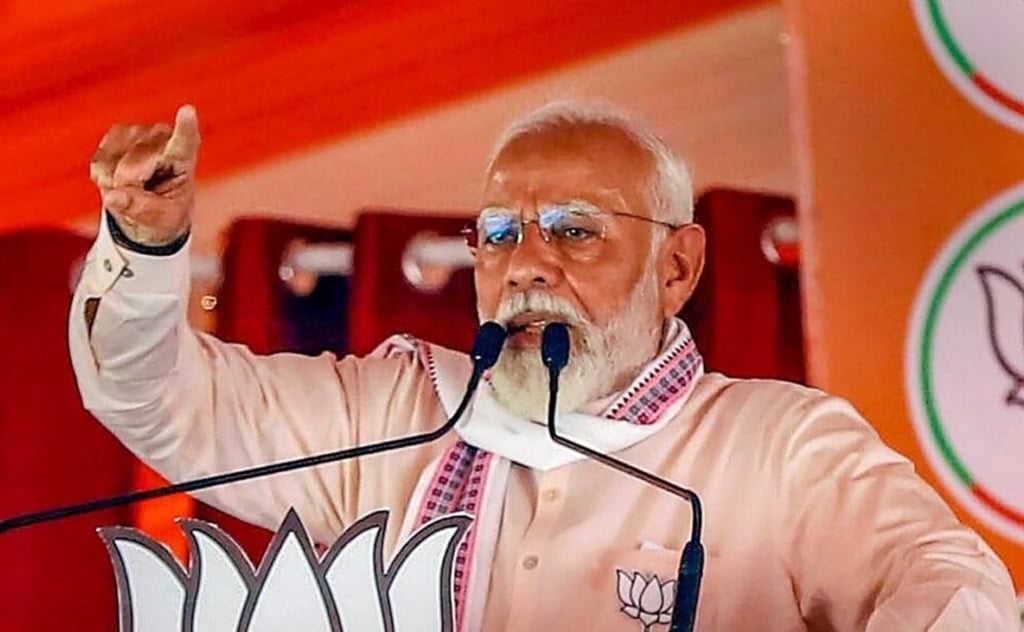
Indian Prime Minister Narendra Modi has stepped up divisive rhetoric against Muslims throughout the election campaign, using some of the most harsh language of his decade in power to bash opponents and mobilize Hindu voters as his party seeks a historic third term.
Modi has referred to the country’s Muslim minority as “infiltrators” in a series of rallies since India’s general election began on April 19, likened his Bharatiya Janata party’s arch-rival Indian National Congress to the historic pro-Pakistan Muslim League, and accused Congress of attempting to “loot” wealth from Hindus and redistribute it to Muslims.
“Congress wants to take part of the rights of [lower-caste Hindus] and give it to their vote bank,” Modi said during a campaign event in Goa on Saturday. “And you know who Congress’s favourite vote bank is,” he added, making a thinly veiled reference to Muslims.
The same day, Anurag Thakur, the BJP’s communication minister, warned another crowd that Congress “wants to give your children’s property to Muslims”.
Modi’s intensification of aggressive rhetoric comes as the BJP seeks to rally support among Hindus, who account for over 80% of the population, in order to gain a super-majority and entrench its domination in national politics.
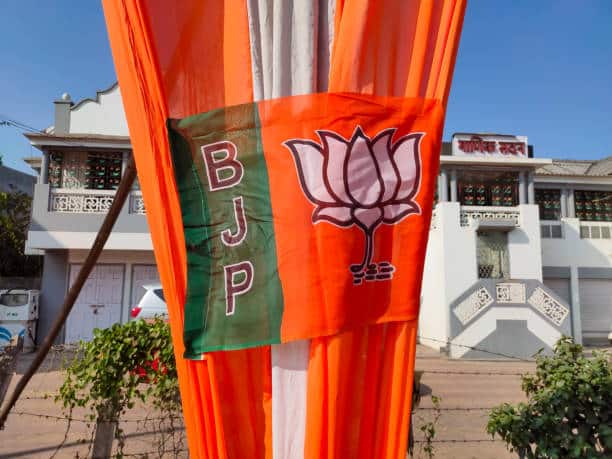
Flag or election symbol of Bhartiya Janata Party: Getty Images
Modi Ups his Hindu Muslim Rhetoric
The BJP aims to win 370 of the 543 available parliamentary seats, up from 303 in 2019. The results will be announced on June 4, following six weeks of delayed voting.
However, observers who consider the Hindu nationalist BJP as the favourites believe this goal will be difficult to achieve, citing evidence of a dip in turnout during the first two rounds of voting and anti-incumbency feeling in portions of the ruling party’s northern heartland.
“I don’t think I have seen a prime minister speak such inflammatory rhetoric,” said Asim Ali, an independent political analyst, adding that Modi was attempting to “energise the Hindutva [Hindu nationalist] base”.
“Because the prime minister is saying this now, local level BJP operatives are free to take it up.”
The divisive turn has enraged Modi’s detractors, who have filed complaints with India’s electoral commission for suspected violations of the code of conduct. The body sent a notice to the BJP last week, but did not identify Modi and has yet to take action.
During a rally in Agra, home to the Taj Mahal monument erected by a Muslim Mughal ruler, Modi accused Congress of pandering to religious minorities.
“The politics of appeasement has divided the country into pieces,” Modi claimed, claiming that opposition parties are attempting to “steal” from Hindus. Muslims make up approximately 14% of India’s population.
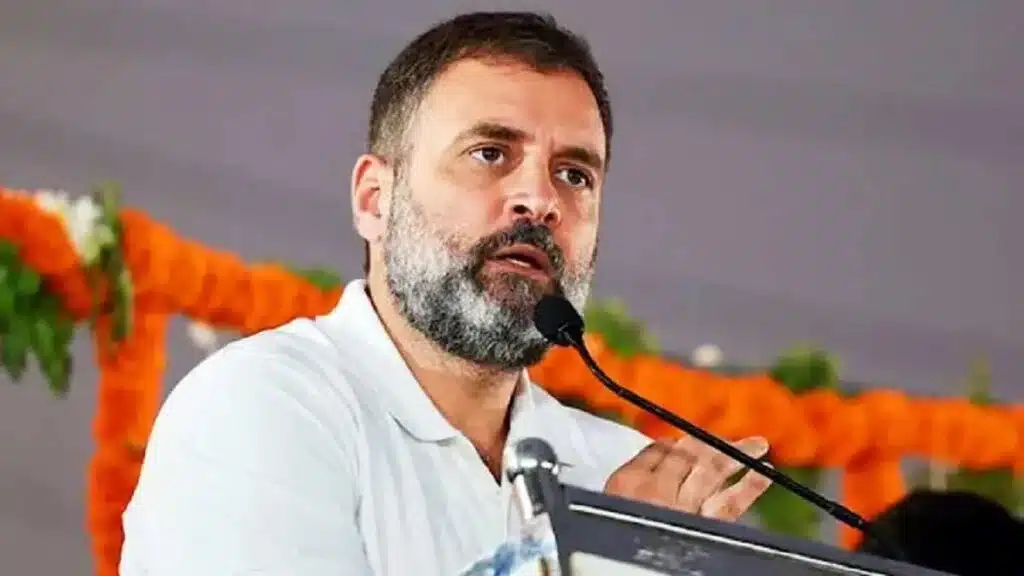
Defence Congress leader Rahul Gandhi: Getty Images
India’s Rahul Gandhi Steps Up Pressure
Congress denies these allegations, accusing the business-friendly BJP of diverting government funding to billionaires while ignoring unemployment and inequality. It has promised to conduct a caste census, which it claims will help allocate resources to underprivileged communities.
Rahul Gandhi, a Congress leader and Modi’s most visible opponent, said on Friday that Modi appeared “very nervous”.
“Narendra Modi has snatched money from the poor . . . [and] given it to the billionaires,” he claimed. “We will give that money to the poor people of India.”
Because India has tight restrictions forbidding the publication of exit polls during the election, there is no confirmed information about any party’s standing.
However, many doubt that the BJP, which swept much of India in 2019, would be able to considerably increase its seat total.
Reaching 370 seats appears to be “a bit of a puzzle, as to where the extra seats are going to come from,” according to Ronojoy Sen, a political scientist at the National University of Singapore, who speculates that the objective may have been designed to motivate party cadres.
Both Hindu and Muslim voters in Agra expressed dissatisfaction with the campaign’s provocative tone. Rizwan Ahmed, 18, said there was “no such problem” between faiths, but “politicians just say things and then people twist the statements”.
“This kind of polarisation and communal rhetoric, of course it’ll appeal to your core voters,” Sen said in a statement. “But I’m not sure how well it works in expanding the core.”
Source: Financial Times
Business
Global Negotiations On A Treaty To End Plastic Pollution At Critical Phase In Canada
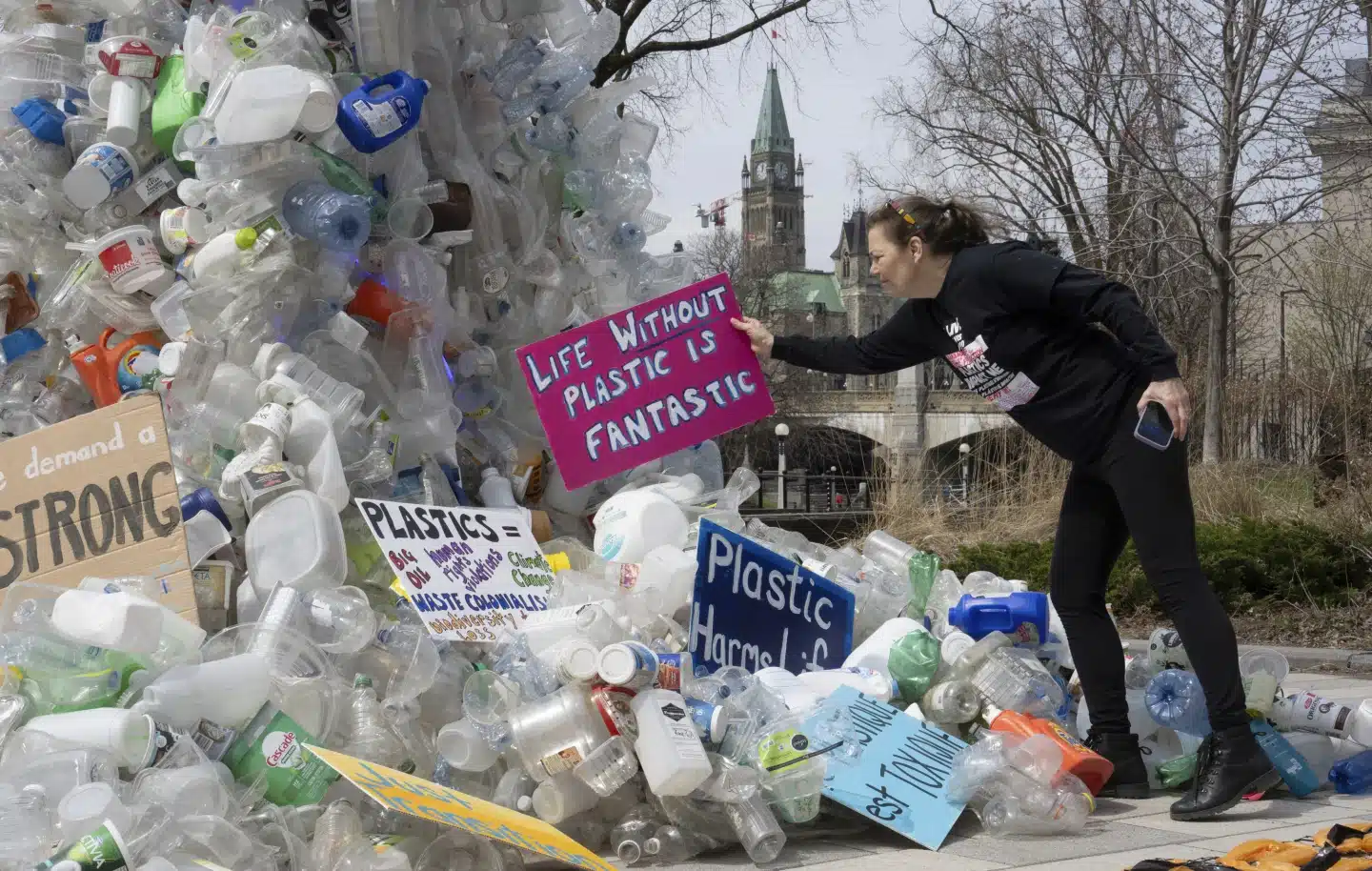
Ontario, Canada. Negotiators from most states are currently discussing the draft of a worldwide treaty aimed at eradicating plastic pollution, marking the first instance of such negotiations.
Delegates and observers at the Intergovernmental Negotiating Committee on Plastic Pollution regarded it as a positive development, and discussions have transitioned from conceptualization to the formulation of a treaty at this fourth out of five planned plastics summits.
The concept of internationally restricting the production of plastic is highly controversial. The document continues to exist despite the vehement opposition from countries and companies involved in plastic production, as well as oil and gas exporters. The majority of plastic is derived from fossil fuels and chemical compounds.
The Ottawa session was set for late Monday or early Tuesday. During Monday night’s meeting, there was a heated debate about whether the working groups should prioritize the issue of plastic manufacture before the upcoming and final meeting.
AP – VOR News Image
Global Negotiations On A Treaty To End Plastic Pollution At Critical Phase In Canada
According to Stewart Harris, a representative of the International Council of Chemical Associations, the members are advocating for a treaty that specifically addresses the recycling and reuse of plastic, sometimes known as “circularity.”
Many scientists from the Scientists’ Coalition for an Effective Plastics Treaty attended the meeting to present scientific facts on plastic pollution to negotiators. Their objective was to counteract any misinformation that may be circulating.
Bethanie Carney Almroth, an ecotoxicology professor at Sweden’s University of Gothenburg and coalition co-leader, stated that yesterday’s claim about the lack of microplastic data is factually incorrect. In reality, there have been 21,000 published articles on micro and nanoplastics. “It resembles the game Whac-A-Mole.”
AP – VOR News Image
Global Negotiations On A Treaty To End Plastic Pollution At Critical Phase In Canada
According to her, scientists have been subjected to harassment and intimidation by lobbyists. She informed the United Nations that a lobbyist shouted directly at her during a meeting.
Ecuador’s lead negotiator, Walter Schuldt, stated that despite their divergences, the countries represented have a shared objective of advancing in the treaty process.
“In the interview, he emphasized that we are discussing the preservation of life in the future, encompassing not only human life but also all forms of life on Earth,” he stated.
He expressed his pride in participating in and contributing his small but meaningful effort to the worldwide initiative to tackle an environmental issue.
The negotiators’ objective is to finalize a treaty by the conclusion 2024. The topics given to expert working groups by tonight will progress to the final stage of discussions in autumn in South Korea.
Without undertaking this preparatory work in between meetings, it would be intimidating to successfully conclude the negotiations within this year. Several nations expressed their dedication to collaborating during the intervals between talks on Sunday evening.
The treaty negotiations commenced in Uruguay in December 2022, and Rwanda and Peru’s subsequent submission of the resolution initiated the process in March 2022.
Progress was sluggish at the Paris discussions in May 2023 and the Nairobi talks in November as countries deliberated about the process’s regulations.
Upon the arrival of numerous negotiators and observers in Ottawa, Luis Vayas Valdivieso, the committee chair from Ecuador, reminded them of their objective and urged them to exhibit ambition.
“We have a responsibility to create a new treaty that will stimulate and direct the necessary actions and global collaboration to achieve a future devoid of plastic pollution,” he stated. “We must not disappoint them.”
The delegates have discussed the treaty’s scope, chemicals of concern, problematic and avoidable plastics, product design, and financing and implementation.
Delegates also simplified the cumbersome assortment of choices from the previous meeting.
Many individuals journeyed to Ottawa from communities impacted by plastic manufacture and pollution. Residents residing near petrochemical plants and refineries in Louisiana and Texas distributed postcards to the U.S. State Department with the message, “We desire your presence.”
AP – VOR News Image
Global Negotiations On A Treaty To End Plastic Pollution At Critical Phase In Canada
The members of the Break Free From Plastic movement journeyed collectively and urged negotiators to personally witness air and water contamination in their regions.
“This remains the most optimal choice we possess to witness transformation in our communities.” Corporations heavily influence them. Jo Banner, a St. John the Baptist Parish resident in Louisiana, expressed their inability to attend the local government. “It seems that this is my sole opportunity and source of optimism to assist my community in recovering and finding solace.”
Members of an Indigenous Peoples’ Caucus held a news conference on Saturday. They expressed concern that microplastics are polluting their food supply. They emphasized that this pollution threatens their communities and ways of life, which are guaranteed to them indefinitely. They perceived a lack of acknowledgment of their opinions.
“Our stakes are larger.” “These are our hereditary territories that are being contaminated with plastic,” Juressa Lee, a resident of New Zealand, expressed following the occurrence. “We are individuals or groups who possess legal rights, rather than individuals or groups with an interest or involvement in a particular issue.” We should be granted greater autonomy in expressing our opinions and judgments than individuals responsible for the issue.
Historically, plastic was not present, but currently, in the Bay of Plenty, the sediment and shellfish, which serve as their seafood supply, are contaminated with little plastic particles. Lee stated that they consider nature’s “resources” as valuable assets.
“Indigenous methods can serve as a guiding force,” Lee stated. “The current approach we are taking is evidently ineffective.”
Vi Waghiyi journeyed from Alaska to advocate for the rights and interests of Arctic Indigenous communities. She emphasizes to decision-makers the need to ensure that this pact provides long-term protection against plastic pollution for future generations.
She stated that their purpose in being here is to serve as the moral compass, ensuring that the decisions made are in the best interest of all individuals.
SOURCE – (AP)
World
President Joe Biden, Mexican President Andrés Manuel López Obrador Discuss Migration In Latest Call
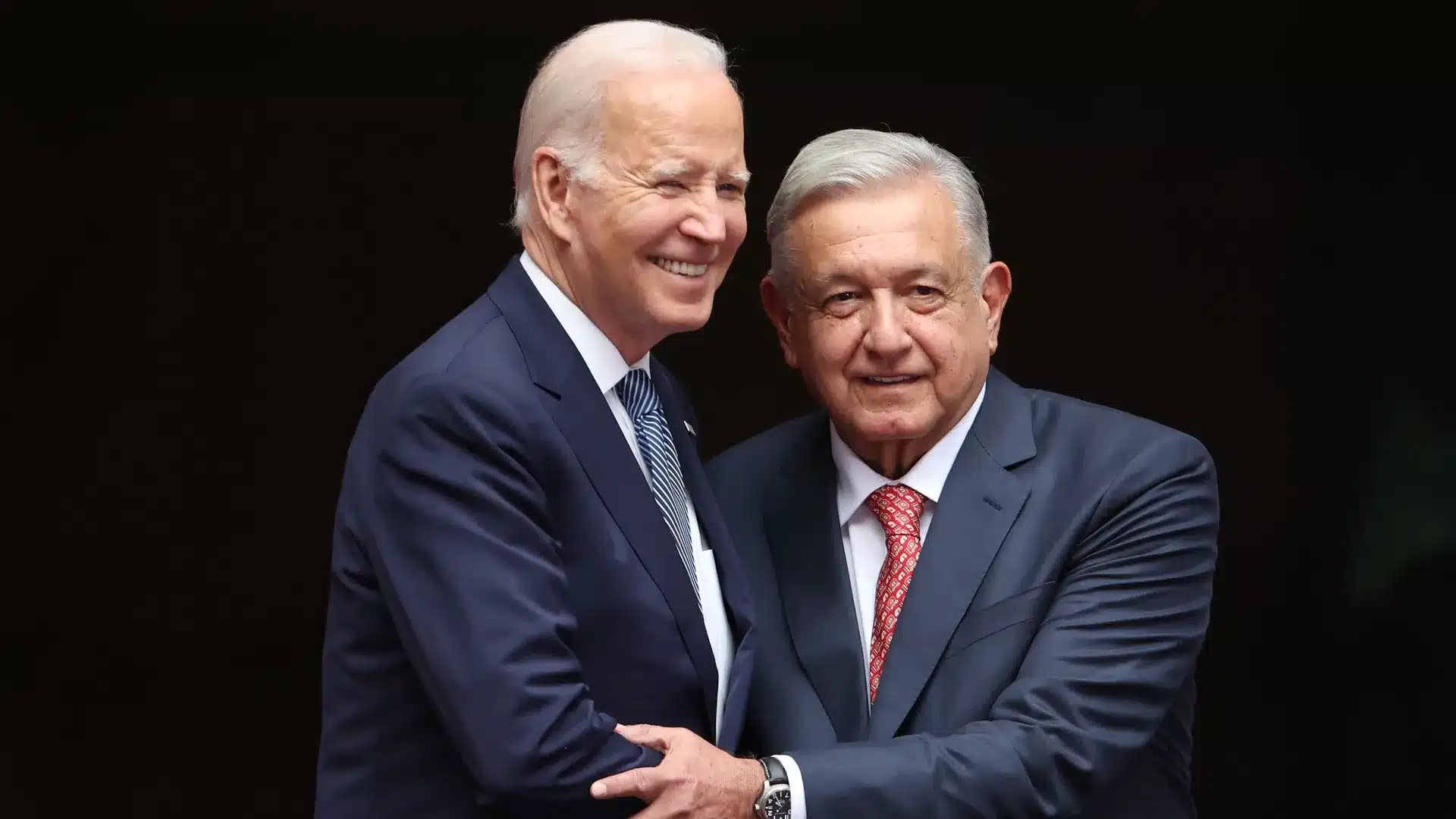
WASHINGTON – President Joe Biden engaged in a conversation with his Mexican counterpart, Andrés Manuel López Obrador, regarding collaboration on migration policy. This discussion took place as the U.S. leader contemplates the possibility of implementing executive measures to address the influx of migrants coming at the southern U.S. border.
AP -VOR News Image
President Joe Biden, Mexican President Andrés Manuel López Obrador Discuss Migration In Latest Call
During his daily press conference in Mexico City on Monday, López Obrador stated that the call took place on Sunday at Biden’s behest. Biden and López Obrador issued a joint statement, stating that their call focused on their collaborative endeavors to “efficiently oversee” migration and “enhance operational effectiveness” at the U.S.-Mexico border.
“We have periodic discussions,” López Obrador stated. “I actively search for him, and he actively searches for me, and then we engage in conversation.”
The Mexican leader stated that significant advancements have been achieved in managing unlawful migration by effectively convincing numerous migrants to abstain from using illicit means to traverse nations.
/cdn.vox-cdn.com/uploads/chorus_image/image/71848248/AP23009837497267a.0.jpg)
VOX – VOR News Image
President Joe Biden, Mexican President Andrés Manuel López Obrador Discuss Migration In Latest Call
López Obrador also praised the U.S. Supreme Court’s January ruling, which permitted Border Patrol officials to recommence the removal of razor wire that the state of Texas had put along the border as a means to discourage migration.
The joint statement said that Biden and López Obrador had instructed their respective national security advisors to promptly implement specific measures to decrease irregular border crossings. However, the statement did not provide more details regarding the nature of these actions. According to the statement, the policies will also safeguard human rights.
Following the failure of border legislation in Congress earlier this year, the White House has not dismissed the possibility of President Biden issuing an executive order regarding asylum laws in an attempt to decrease the influx of migrants at the U.S. southern border.
Any unilateral action would probably rely on a president’s authority under Section 212(f) of the Immigration and Nationality Act, which allows extensive authority to prevent the entry of specific immigrants if it is considered harmful to the national interest.
President Joe Biden, Mexican President Andrés Manuel López Obrador Discuss Migration In Latest Call
Administration officials have extensively examined multiple alternatives for months, although Biden has not yet decided how to proceed with unilateral steps. White House advisers have observed that there is currently no pressing need for the president to take any action, as the number of unlawful border crossings has decreased since reaching a peak of 250,000 in December, thanks to increased enforcement operations by Mexican officials.
SOURCE – (AP)
-
Entertainment5 months ago
Robert Downey Jr. Won’t Be Returning To The Marvel Cinematic Universe As Tony Stark
-
Politics5 months ago
Unveiling the Power and Influence of The Conservative Treehouse
-
Sports4 months ago
Saints’ Aggressive Play-Calling Ends Up Coming Back To Hurt Them In Loss To Rams
-
Celebrity5 months ago
Norman Lear, Producer Of TV’s ‘All In The Family’ And Influential Liberal Advocate, Has Died At 101
-
Innovation5 months ago
Sony Debuts First PS5 Controller For Disabled Gamers
-
Business4 months ago
Nike Says It Will Cut $2 Billion In Costs In A Major Warning For Consumers


